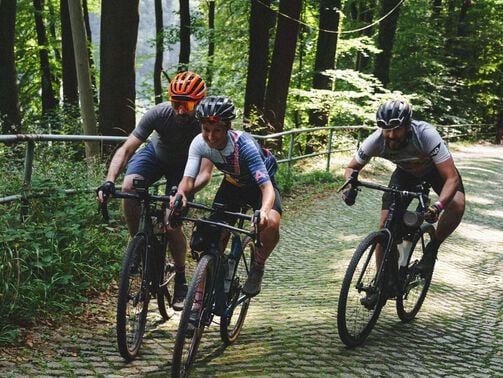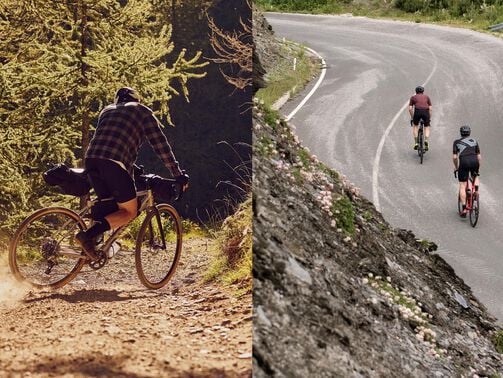Best Bikepacking Bikes
Bikepacking setups allow you the freedom to go wherever your heart desires, unlike a heavier, more traditional pannier setup more synonymous with cycle touring.

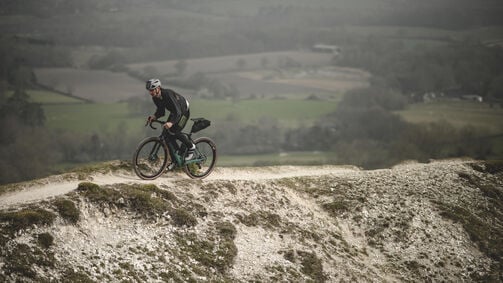
What's the best bikepacking bike?
With so much choice - gravel bikes, mountain bikes, cyclo-cross bikes, road bikes - how do you know which one is right for you? Put simply, the spectrum of bikepacking bikes is as broad as their riders, with anything from sleek, lightweight speed-machines to rough and ready adventure rigs.
The world is your bike path
There are no rules when it comes to bikepacking routes. Some of the greatest adventures happen in your backyard, but bikes were made for exploring: anything from a couple of hours from home to wild camping in your local woods to a multi-week epic spanning several hundred miles.
There’s just something about carrying everything you need for a few days’ cycling that you can’t get anywhere else. If you’re just starting out, combine some of your favourite routes and gradually expand your radius. As the saying goes, you’ll only find the best paths by getting lost and that’s the beauty of bikepacking.
Venturing further afield adds to the appeal for many. Travelling abroad with your bike is one of the best ways to experience other cultures, particularly when you’re off the beaten track in remote places seldom seen in travel brochures. Bikepacking setups allow you the freedom to go wherever your heart desires, unlike a heavier, more traditional pannier setup more synonymous with cycle touring.
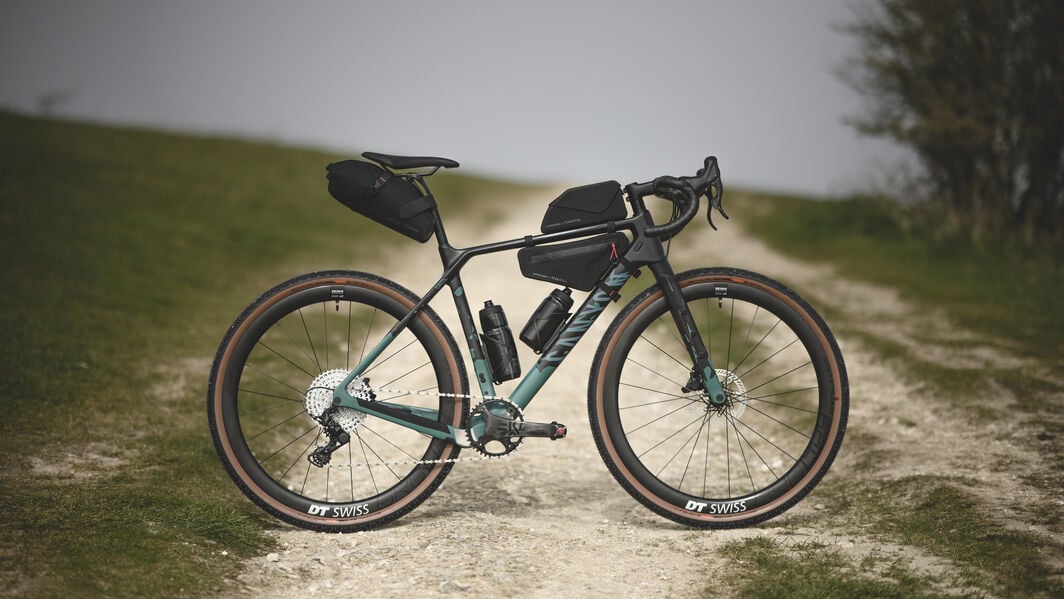
Bikepacking can be as fast or as slow as you like. There are a myriad of established routes, such as the Great Divide Mountain Bike Route in the US (the same route the Tour Divide bikepacking race endures) and the Highland Trail 550 in Scotland, which lend themselves to a leisurely pace as much as they do a speedy one.
There’s a whole world of bikepacking races and their routes for you to get your teeth and tyres stuck into when you have the right bike.
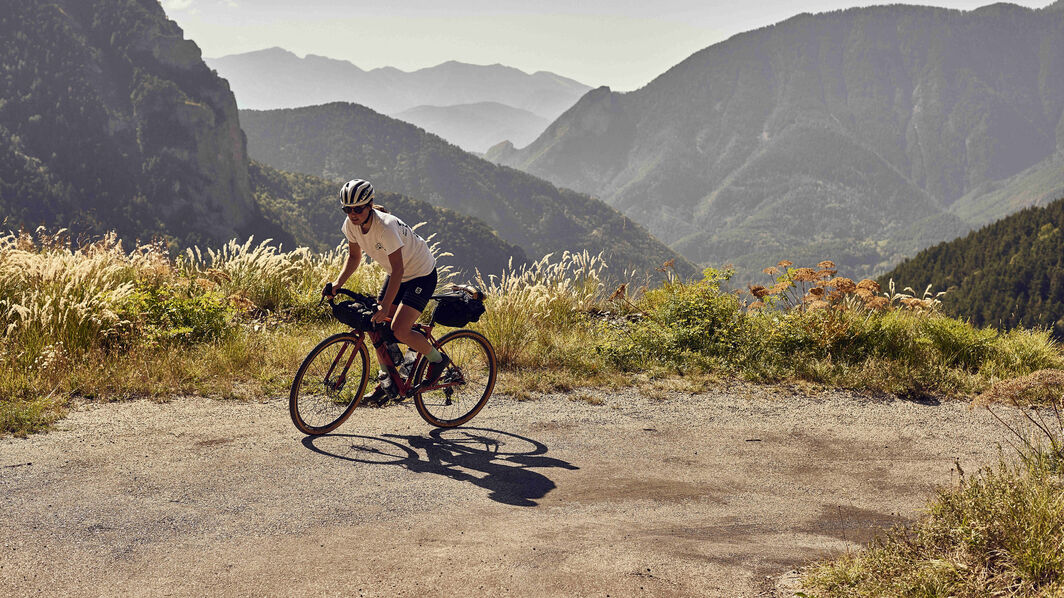
Choosing the perfect bikepacking bike
Bikepacking does what it says on the tin: you pack everything on your bike! The amount you bring is entirely up to you and depends on your comfort levels. It’s true that you can ride almost any bike, but we’ll highlight some important features you’ll need to consider when looking for the ultimate bikepacking bike.
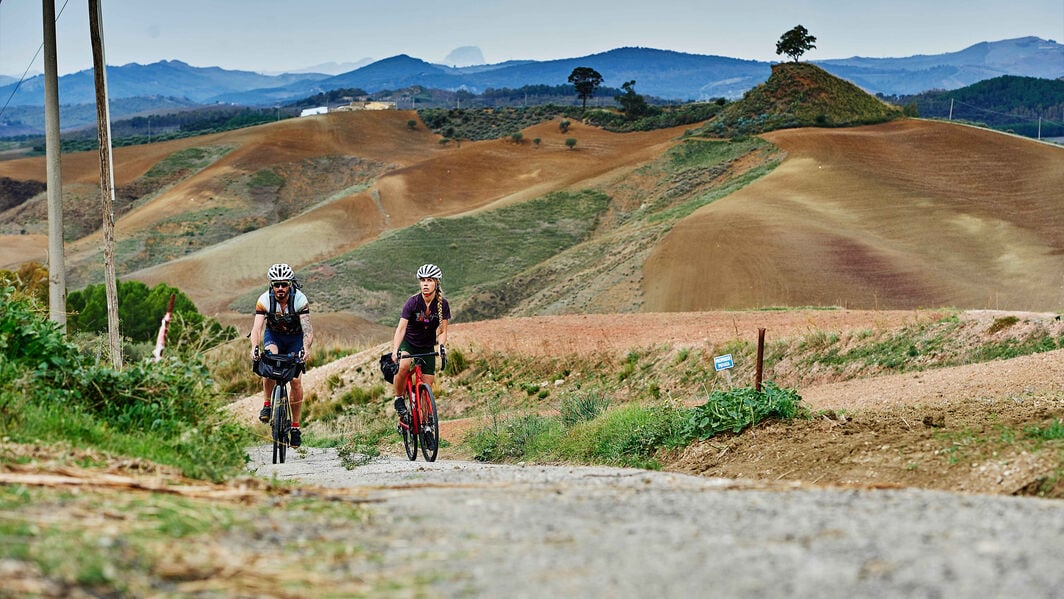
What to look for in a bikepacking bike
Wheels and tyres
You’ll need to decide what kind of terrain you’ll predominantly seek out on your adventures. As the main point of contact between the path and the bike, wheels and tyres make a huge difference to your bikepacking experience.
Riding off-road brings its own challenges, but there are a variety of options to suit every rider. 650B wheels are increasingly popular due to their ability to seat wider rubber than their 700c counterparts. You’ll see 650B wheels on our smaller size Grail and Grizl bikes, as they enhance the handling while eliminating toe overlap when you’re twisting and turning along the trails.
Skinnier tyres are great for trips on tarmac, but you’d be best served going a little wider than the classic 25mm rubber of yesteryear. Nowadays, a lot of endurance road bikes have room for 30mm+ tyres, which is great for adding comfort over long distances on a loaded bike while maintaining speed on the road.
Off-road riding requires more grip - there’s no two ways about it. Those tree roots, loose rocks and muddy puddles need more traction, so make sure you get familiar with knobbly tyres.
Ever wanted to go on a bikepacking adventure in the snow? Now you can, with the enormous tyres on a fatbike that can glide over just about anything in its path.
Steel, carbon or aluminium?
Riding your bike for days on end with everything you need to keep going is a tough ask for the humble bicycle. The frame needs to be strong and ready to endure the adventure. Steel bikes are heavier but they’re often very comfortable and easy to fix if the worst happens. Aluminium bikes are as popular as they are budget-friendly, and they’re tough enough to handle plenty of extra weight.
Carbon is the ultimate lightweight bike material and has come a long way where durability and capability are concerned. It’s a solid material and increasingly common in the bikepacking world, but take note of the weight limit.
Carry all the things!
Bikepacking bags are a staple for most riders these days. They’re lightweight, compact and importantly they’re transferable to your other bikes. While panniers have greater capacity for everything including the kitchen sink, bikepacking bags are great for adventures where weight and speed are important. They strap on to the seatpost, top tube and handlebars, so you can play around with where you put each item of kit.
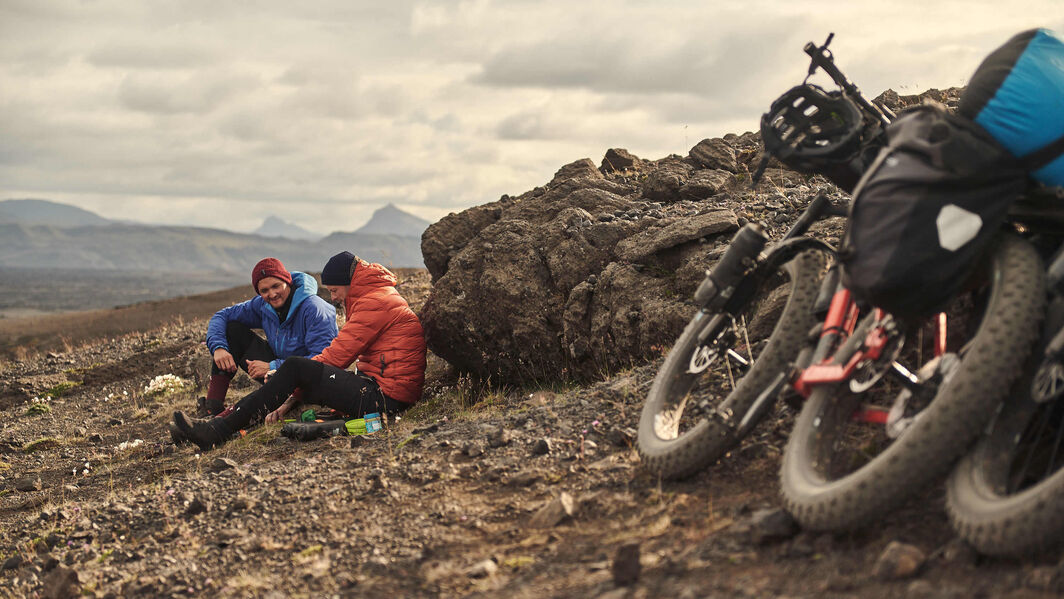
Some gravel bikes and mountain bikes have extra mounting points (on the fork, for example) to hold more gear than you can shake a stick at. These mounts can also be used for extra bottle cages so you never run out of water. On that note, make sure you can fit your water bottles in your frame alongside your bags, otherwise you might want to consider a bladder that either slots into a frame bag or a backpack.
If you want to protect your frame’s paintwork, consider protective film (like those provided with the Grail) to prevent the straps rubbing against the frame.
Geometry
A lot of bikepacking bikes incorporate slacker frame geometries, meaning the headtube angle is less aggressive. More relaxed geometry lends itself to more technical riding, offering increased stability when the going gets rough. A longer wheelbase, and therefore overall longer bike length, provides greater durability over loose terrain compared to shorter (twitchier) bikes.
Handlebar technology has significantly improved in the last few years, including developments such as the double-decker bar on the Grail. Wider bars offer more stability while riding on the tops, and if you add flared bars into the mix, you’ll relish a tricky descent with the increased control.
Endurance and gravel bikes like the Endurace, Grail, Grizl or Inflite have drop-bar setups, while a cross-country mountain bike like the Exceed has wide flat bars for more technical terrain away from the tarmac.
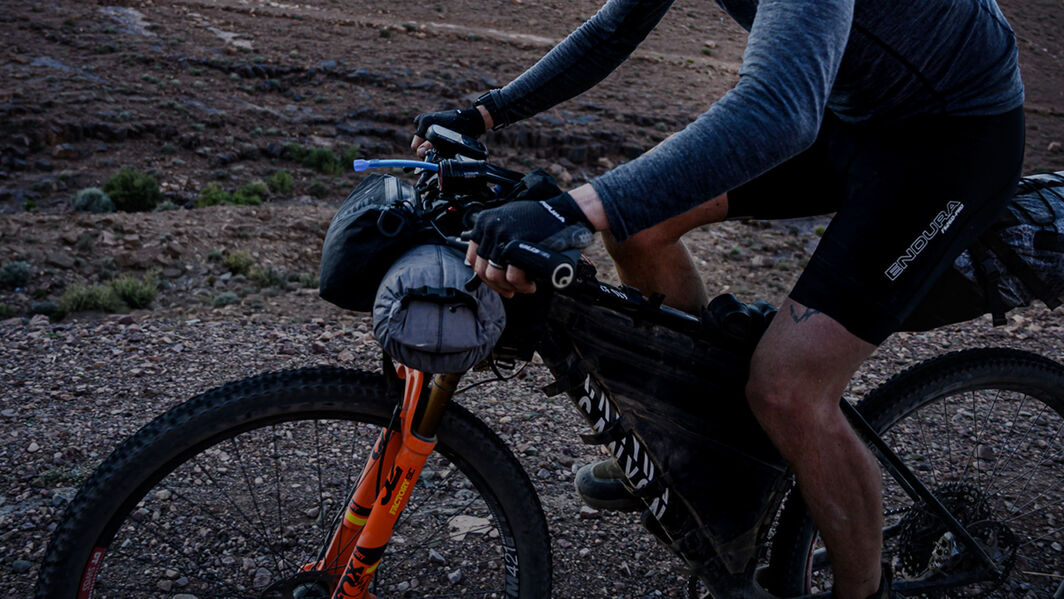
Don’t grind your gears
Hills, particularly those that take you off-road, require a wider range of gears. It’s a personal decision and depends on how fit you are and how heavy your bike may be. You’re less likely to need your 11T sprocket and more likely to need a bigger granny gear to crest the summit.
Single chainring setups (a.k.a. One-by or 1x) are a favourite among bikepackers for their simplicity (no front derailleur or gear shifter) and reliability. Even road bikes can have 1x setups these days, though there’s still a case for two chainrings when you’re on long Alpine descents.
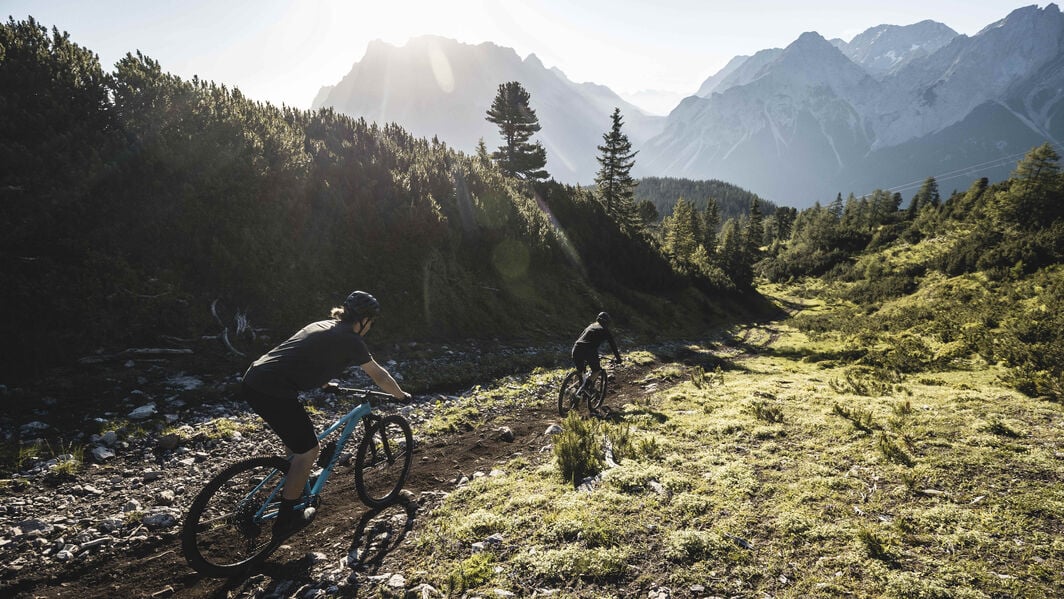
What does all this mean?
Bikepacking bikes don’t have to stick to the rules. Comfort is key where multi-day trips are concerned, and what this means for your setup will depend on the terrain you’re riding. If you want to fly along the tarmac with the ability to shred on some gravel, the Grail is a perfect starting point. If you want remote riding as far away from paved roads as possible, take a look at the Exceed or Grand Canyon. And if you want extreme terrain such as sand or snow under your tyres, the Dude fatbike is hard to beat.
Var den här artikeln till hjälp?
Tack för din feedback

